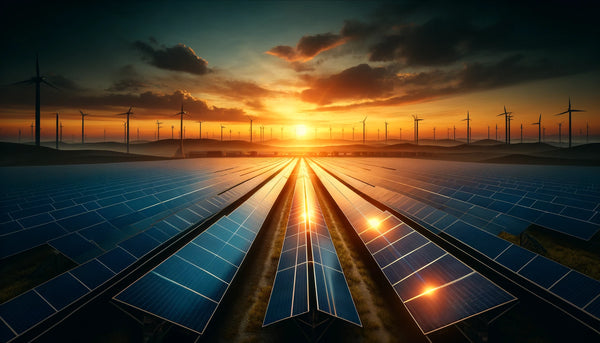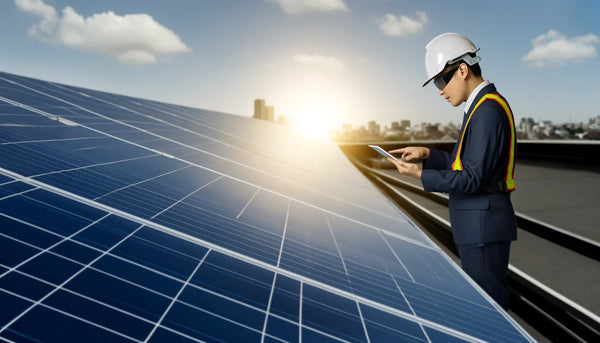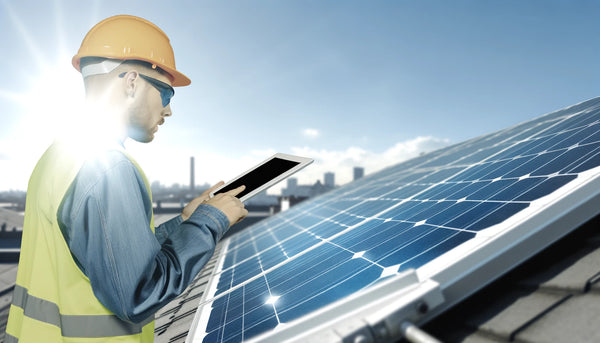- Green Glow
- Posts
- 🌱 From Sunlight to Savings: Maximizing Efficiency with Solar Panels ☀️💰
🌱 From Sunlight to Savings: Maximizing Efficiency with Solar Panels ☀️💰
Discover how to maximize efficiency and savings with solar panels. Learn about harnessing solar energy, increasing panel efficiency, reducing energy bills, and accessing government incentives.
In an era where environmental consciousness is at the forefront of global discussions, the quest for renewable energy sources has never been more critical. Among these, solar power stands out as one of the most promising solutions. Solar panels, often installed on rooftops or in large solar farms, are revolutionizing the way we produce electricity. Not only do they offer a clean and sustainable alternative to fossil fuels, but they also present significant economic advantages for both individuals and businesses. In this article, we delve into the world of solar energy, exploring how it works and how maximizing efficiency with solar panels can lead to substantial savings.
Table of Contents

Understanding Solar Energy
Solar energy is derived from the radiant light and heat emitted by the sun. This energy is harnessed through the use of photovoltaic (PV) cells, which are the building blocks of solar panels. When sunlight strikes these cells, they generate direct current (DC) electricity. This electricity is then converted into alternating current (AC) by inverters, making it compatible with the electrical systems used in homes and businesses.
The Efficiency Factor
The efficiency of solar panels refers to their ability to convert sunlight into electricity. Over the years, significant advancements have been made in solar panel technology, leading to higher efficiency rates. Modern solar panels can now convert more than 20% of sunlight into electricity, with some premium models achieving efficiencies exceeding 25%. Higher efficiency means that more sunlight can be converted into usable energy, maximizing the output of each solar panel.
Factors Influencing Efficiency
Several factors influence the efficiency of solar panels:
Sunlight Intensity:
Solar panels operate most efficiently when exposed to direct sunlight. However, they can still generate electricity on cloudy days or in partial shade, albeit at reduced efficiency.
Panel Orientation and Tilt:
Proper orientation and tilt angle maximize the amount of sunlight that falls on solar panels. In the northern hemisphere, panels should generally face south to receive the most sunlight throughout the day.
Temperature:
Solar panels perform best in cooler temperatures. High temperatures can decrease efficiency slightly, although modern panels are designed to mitigate this effect.
Dirt and Shading:
Accumulation of dirt, dust, or shading from nearby objects can obstruct sunlight and reduce panel efficiency. Regular cleaning and ensuring panels are free from obstructions are essential for optimal performance.

Maximizing Efficiency for Savings
Maximizing the efficiency of solar panels is not only beneficial for the environment but also for your wallet. Here's how:
Reduced Energy Bills:
By generating your electricity from solar panels, you can significantly reduce or even eliminate your reliance on traditional utility companies. This translates to lower electricity bills over time, providing substantial savings.
Net Metering:
Many regions offer net metering programs, allowing solar panel owners to sell excess electricity back to the grid. This can further offset electricity costs and potentially generate additional income.
Tax Incentives and Rebates:
Governments around the world incentivize the adoption of solar energy through tax credits, rebates, and other financial incentives. Taking advantage of these programs can lower the upfront cost of installing solar panels and accelerate the return on investment.
Increased Property Value:
Homes and businesses equipped with solar panels often command higher property values. Potential buyers are attracted to the prospect of lower energy bills and the environmental benefits associated with solar energy, making solar-equipped properties more desirable in the real estate market.

Conclusion
As technology continues to advance and awareness of environmental issues grows, solar energy is poised to play an increasingly significant role in our energy landscape. By maximizing the efficiency of solar panels, we can harness the power of the sun more effectively, reducing our carbon footprint and saving money in the process. Whether you're a homeowner, business owner, or policymaker, embracing solar energy is a win-win solution for both the planet and your finances. So why wait? Start your journey towards sustainability and savings today with solar panels.
FAQs
What factors affect the efficiency of solar panels?
Efficiency can be influenced by sunlight intensity, panel orientation, temperature, and cleanliness, among other factors.
How much money can I save with solar panels?
Savings vary depending on factors such as energy consumption, local electricity rates, incentives, and the size and efficiency of the solar panel system.
Are there government incentives for installing solar panels?
Yes, many governments offer tax credits, rebates, and other incentives to promote the adoption of solar energy.
Do solar panels work on cloudy days?
While they are most efficient in direct sunlight, solar panels can still generate electricity on cloudy days, albeit at reduced efficiency.
What is net metering?
Net metering allows solar panel owners to sell excess electricity back to the grid, offsetting their electricity costs.
You May Also Like
🌱 Sun-Powered Savings: How Solar Panels and Efficiency Measures Can Transform Your Home 🌞💡🏡
🌱 Corporate Sustainability: The Role of ESG in Business Strategy 🏢💼🌍
🌱 The Role of Government Policies in Controlling Pollution 🏛️🛑💨
🌱 The Economic Benefits of Pollution Control: Saving Money and the Environment 🚫💸
🌱 Green Energy Trends to Watch: Leading the Charge to Sustainability 📈🔋💡